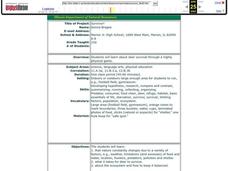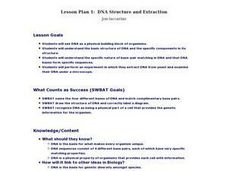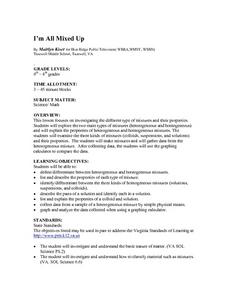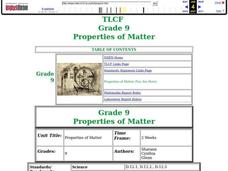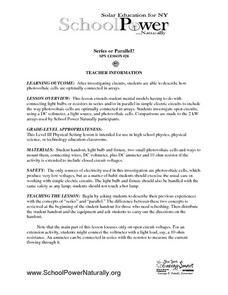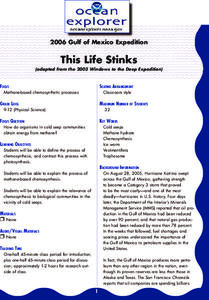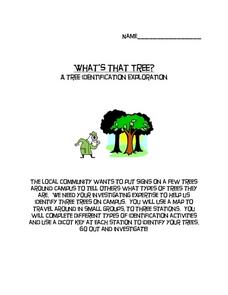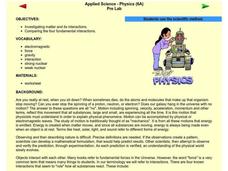Curated OER
Top Quark Lab
Young scholars find the mass of the top quark. In this physics lesson, students create a vector diagram from a given set of data. They discuss their calculations and findings in class.
Curated OER
Exploring Hawaiian Mountain Zones
Fourth graders watch a video that describes the climate and vegetation zones of Hawaii. They describe the different physical conditions that create vegetation zones from the sea to the mountains. In groups, they create an illustrated...
Curated OER
Northwest Hawaiian Islands
Students compare and contrast places around the world. Students analyze the effects of human activity on the physical environment and devise plans to address the consequences. Students also focus on geographical topics such as formation...
Curated OER
Survivor!
Students play a game in physical education class to examine how a deer survives. Using nature as a guide, they discover how it is constantly changing due to weather, food, water, pollution and predators. They discuss the characteristics...
Curated OER
DNA Structure and Extraction
Students see DNA as a physical building block of organisms and comprehend the basic structure of DNA and the specific components in its structure. They can explain the specific nature of base-pair matching in DNA and that DNA bases form...
Curated OER
I'm All Mixed Up
Middle school scientists compare and contrast heterogeneous and homogeneous mixtures. They differentiate solutions, colloids, and suspensions by examining samples of each. Note that the bulk of the lesson plan directs you how to...
Curated OER
Properties and Perfectly Polymeric Sodas
Students examine physical and chemical properties of plastics, interfaces of plastics, and forms of plastics. In three lab activities, students discover the two characteristic responses of plastics to heating, thermoplastic or...
Curated OER
Properties of Matter
Ninth graders explore the molecular structure of matter and how it can affect the physical characteristics of a specific material. They demonstrate that isotopes of an element have different masses. Students demonstrate that the rates of...
Curated OER
A Simple Motor
Instructions for building a simple electromagnetic motor are provided for the teacher. Aside from some sketchy background information and a list of content standards to be met, that is about all you will find in this resource. The motor...
Curated OER
Series or Parallel?
Physics classes that are studying electricity connect photovoltaic cells into both series and parallel circuits. Inquiry and critical thinking come into play as learners try to determine which circuit is more productive. They associate...
Curated OER
The Big Circle
Students explore geography by participating in a mapping activity. In this concentric ring lesson plan, students utilize a poster board, string and markers to identify their current location within the entire world. Students write about...
Acoustical Society of America
Anatomy of a Wave
Pair physical science learners up, and have one describe a transverse wave while the other blindly attempts to draw it. Then reveal an actual diagram and explain the different parts of the wave: crest, trough, wavelength. Though most of...
Curated OER
Prairie Plant Investigation
Young scholars carefully observe prairie plants and record their observations in a science journal. They examine the root systems of grasses and flowers and surmise how these plants can grow together on the prairie.
Curated OER
This Life Stinks
Chemosynthetic communities of cold seep areas are considered in this lesson. Working in collaborative groups, marine biology or oceanography learners research and prepare a report about oxidation-reduction reactions involved with...
Curated OER
River Research
Students use the internet to research the streams and rivers found in Illinois. Using the information, they identify and describe the rivers and streams along with the physical characteristics of a river ecosystem. They share what they...
Curated OER
Soil Investigations
Students examine the basics about soil. In this soil lesson students describe the physical properties of soil and explain what soil profile is.
Curated OER
Great Rivers 2: The Ups and Downs of River Flooding
Second in a three-part lesson on rivers, this lesson focuses on the flooding that occurs in riparian locations. First, learners take a look at facts about the Amazon River. They read online materials and fill in a worksheet as they...
Curated OER
Urban Heat Islands: An Introduction to Energy Transfer and Transformation
Elementary school physical scientists explore kinetic mechanical energy by dropping a golf ball on different surfaces. They discuss how human made materials might react to light differently from nature made materials. This lesson plan...
Curated OER
Chemical Compounds
Your young chemists will find these slides very informative. Groups and periods of the periodic table are labeled and described according to the charge. Comprehensive explanations of physical and chemical properties and how they relate...
Curated OER
Mimicking Nature; Science, Aviation, Flight, Wings
Students consider the relationship between form and flight and investigate the history of man made flight and how wing shape and flexibility affects the maneuverability of an aircraft.
Curated OER
Performing Well Under Pressure
Students study the physical properties of minerals and illustrate their functions. In this mineral lesson students construct models of some minerals.
Curated OER
Survival of the Fastest: Predator and Prey in the African Savannah
Students explore the predator-prey relationship using an interactive game. In this biology lesson, students compare their physical attributes. They explain how predators develop to make it stronger and efficient as hunters. Each...
Curated OER
What's That Tree?
Fifth graders identify trees along a nature trail. Using a dichotomous key, 5th graders answer questions to aid in their identification of trees along a specified nature trail. Observations are recorded in their science journals. Sample...
Curated OER
Matter and Energy
Students explore energy by completing a science worksheet in class. In this principles of matter lesson, students define the vocabulary terms force, gravity, nuclear, and electromagnetic before reading assigned text about energy....





